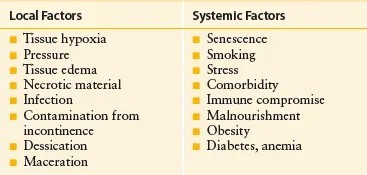What age-related factors may factor into this client's wound healing? Select all that apply.
Insulin resistance
Decreased epidermal turnover
Pigmentation changes
T-cell function decrease
Polypharmacy
Decreased subcutaneous padding
Correct Answer : B,D,F
As people age, the turnover of skin cells decreases, resulting in slower wound healing. This can prolong the healing process and increase the risk of complications.
The immune system's function, including T-cell function, tends to decline with age.
T-cells play a crucial role in the immune response and wound healing. Decreased T-cell function can impair the body's ability to fight infection and promote efficient healing.
With aging, there is a natural loss of subcutaneous fat, which can affect wound healing. Subcutaneous fat provides padding and protection to the underlying tissues, and its reduction can increase the risk of tissue damage and delays in healing.
Insulin resistance, pigmentation changes, and polypharmacy are not directly age-related factors that impact wound healing. Insulin resistance is a condition related to impaired glucose metabolism and can affect wound healing in individuals with diabetes or other metabolic disorders, but it is not necessarily an age-related factor. Pigmentation changes and polypharmacy (the use of multiple medications) may be associated with aging but do not directly affect the physiological processes involved in wound healing.

Nursing Test Bank
Naxlex Comprehensive Predictor Exams
Related Questions
Correct Answer is C
Explanation
It is important to determine if the client has any plans or intentions to act upon the voices' instructions. This information helps gauge the level of risk and guides further interventions and safety measures.
While the other questions may also be important to ask during the assessment, determining if the client believes the voices are real and when the voices began can provide valuable information about the client's perception and the duration of the symptoms. Asking about the use of hallucinogens is relevant to identify potential substance-induced causes of the hallucinations. However, assessing the client's intent and potential for harm is the priority in this situation.
Correct Answer is C
Explanation
Delusions and loss of control can be distressing for the client and potentially disruptive to the unit environment. Moving the client to a quiet place helps create a calm and less stimulating environment, which can help reduce agitation and promote a sense of safety and security.
Using firmness and directing the client to sit for a while may escalate the situation and increase the client's distress. It is important to approach the client with empathy and provide a supportive environment rather than exerting control through firmness.
Suggesting the client take a walk or encouraging the client to use a punching bag may not be appropriate if the client is already displaying signs of agitation and losing control. These interventions may not address the underlying causes of the delusions and could potentially worsen the situation.
Whether you are a student looking to ace your exams or a practicing nurse seeking to enhance your expertise , our nursing education contents will empower you with the confidence and competence to make a difference in the lives of patients and become a respected leader in the healthcare field.
Visit Naxlex, invest in your future and unlock endless possibilities with our unparalleled nursing education contents today
Report Wrong Answer on the Current Question
Do you disagree with the answer? If yes, what is your expected answer? Explain.
Kindly be descriptive with the issue you are facing.
